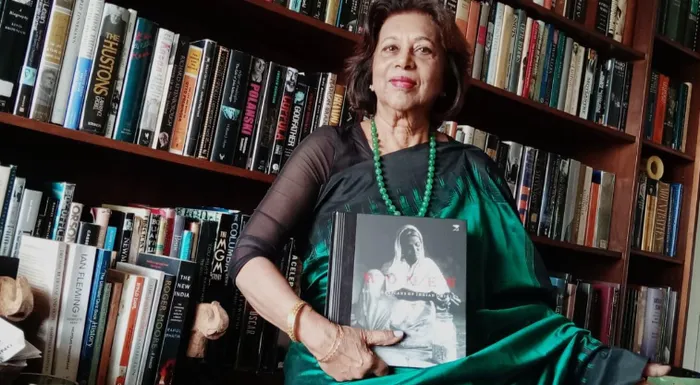
Dr Devi Moodley Rajab is a psychologist, award-winning columnist and author.
Image: Nadia Khan
AS A psychologist, award-winning columnist and author, Dr Devi Moodley Rajab, has not only made significant contributions to her field but has also carved a unique space in the hearts and minds of many through her profound writings.
Rajab, who celebrated her 80th birthday on November 6, shared her interesting journey across cultures, religions and continents over a period of history from apartheid to democracy.
Early years
Rajab, who resides in Westville, said her family's history in South Africa, dated back to her paternal grandfather, Ramiah Moodley, who hailed from the south of India.
She said at age 19, he left his hometown in Karnakul, and travelled first to Mauritius and then came as a ship passenger to South Africa.
“As a young boy, my grandfather had initially travelled from India to Mauritius with his parents where they had set up a business in a place called Flacq. Their plan was to make money and return to India. Not believing in banks they buried their money in tin cans only to find out later that much of it had corroded and eaten by termites. Despondently, they returned to India. When his mother passed away, my grandfather felt little need to stay in India with his father who began gambling in cockfights. My grandfather as the story goes then boarded the SS Truro and headed for Natal.
“Upon his arrival, recruitment agents offered him a job as a supervisor of labour at the railways. Later he started working as a messenger between the British and Boers during the war. He also used to wash their clothes on Sundays.
“During this time, he was introduced to his first wife Fuljhari who he married in April 1904. She was a Hindustani woman and they had three children. However, when she became ill, she told him to take their children and return to India, and to remarry. After her death, he returned to India, where he married my grandmother Govindamma. My father, Percy Ramiah Marimuthoo Moodley, was their first-born,” she said.
Rajab said her grandfather and his family lived in Clairwood in a wood and iron house which he built on a small plot of land.
“My father was a great tennis player who represented Natal in this sport. He was also an avid reader and studied bookkeeping at ML Sultan Technical College, where he later lectured. He was the manager for Peycke and Saunders, who were importers of Bosal exhaust pipes. However, he later started two of his own businesses, a general dealers store and a bicycle shop in Umgeni Road which my mother Amartham and his brother ran.”
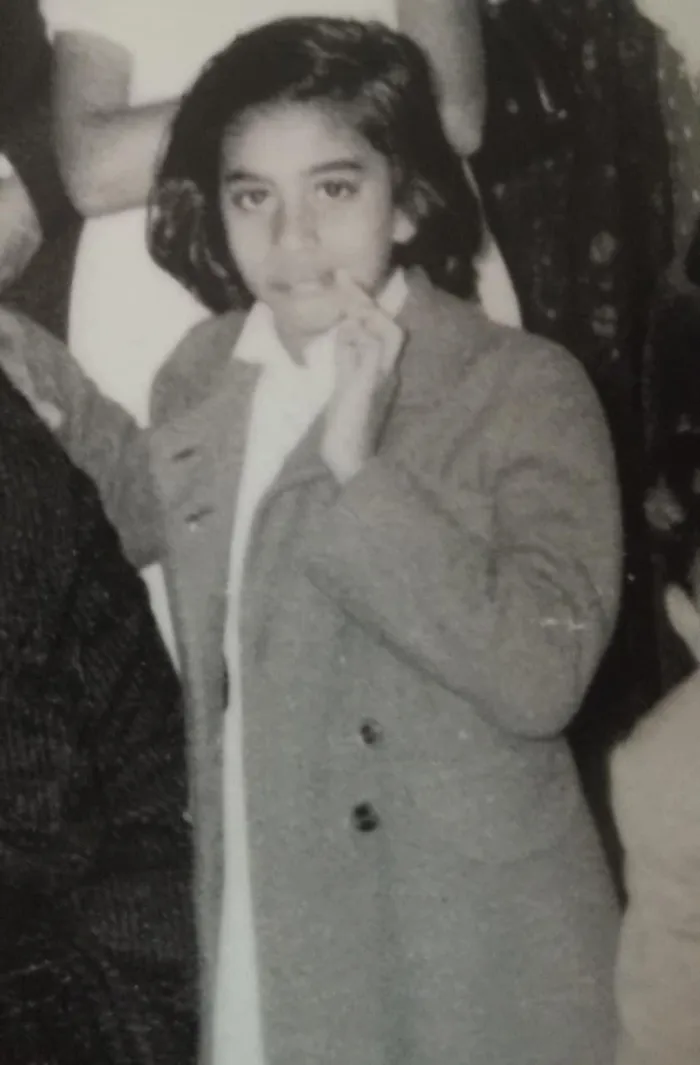
A young Rajab.
Image: Supplied
Rajab, who was born in 1945, said she lived in Crystal Court in Lorne Street, Durban, which was owned by her mother’s family.
“My earliest memory was of the 1949 riots when as a little girl I recall peering anxiously through the window for a sign of my mother who had gone shopping in the riot torn area of Grey Street. During this time, the family owned ice cream factory which was part of the building in which we lived, was saved from being burnt down by a White manager who claimed that he owned the property and that no one should plunder it.”
Rajab said in 1958 her parents moved to Heswall Road on the Berea which was a multi-racial neighbourhood.
She said after they moved, her paternal grandfather lived with the family.
“He was a dignified and knowledgeable man, who spoke with sense. My father was very much like that as well. My grandfather spoke French, Hindi, Telugu, Kannada and Tamil. He would tell us stories from the Ramayana and Mahabharata. We also used to entertain him. He would sing songs in Telugu, and my siblings and I would dance.
"We also had some wonderful memories with our parents who provided us with a joyful, happy and loving childhood. My father encouraged us to read, play sports, and mix with people across the racial, cultural and religious divide as equals. He also taught us good table manners and took us on travels initially within the country and later internationally,” she said.
Rajab, who is the third-born of four children, said that her family left South Africa in 1968 when her eldest sister, Professor Kogila Adam Moodley, a sociologist, married Professor Heribert Adam, a German sociologist.
“We were forced to leave our home because of the Group Areas Act. My only brother Sundru Moodley who is now late, settled in the US, and my younger sister Professor Sibithra Moodley Moore, a political scientist, later married Basil Moore, a Canadian economist."

Rajab, second from left, with her parents, Amartham Moodley and Percy Mariemuthoo Ramiah Moodley; her sister, Professor Kogila Adam Moodley; and brother, Sundru Moodley, now late.
Image: Supplied
Education
Rajab said her primary school education was at Dartnell Crescent School.
“When I was about 11-years-old I wrote my first play, The Magic Boots. Magda Small, my drama teacher choreographed it, and the principal allowed the whole school time off to attend the play.
“During this time, my father also sent me for lessons in elocution. He told me that to survive in this country, you have to learn how to speak properly, otherwise the White man won't listen to you. He also paid quite a penny for me to attend ballet classes. I completed all of my levels and participated in various productions throughout those years,” she said.
Rajab said from Standard six (Grade 8) she attended Durban Indian Girls High School until completing her matric in 1963.
“All our teachers were White but very dedicated though politically cautious and non-committal.”
Rajab said she represented the school in the Jan Hofmeyr Speech Contest, was captain of the Mercury House and head of the debate team.
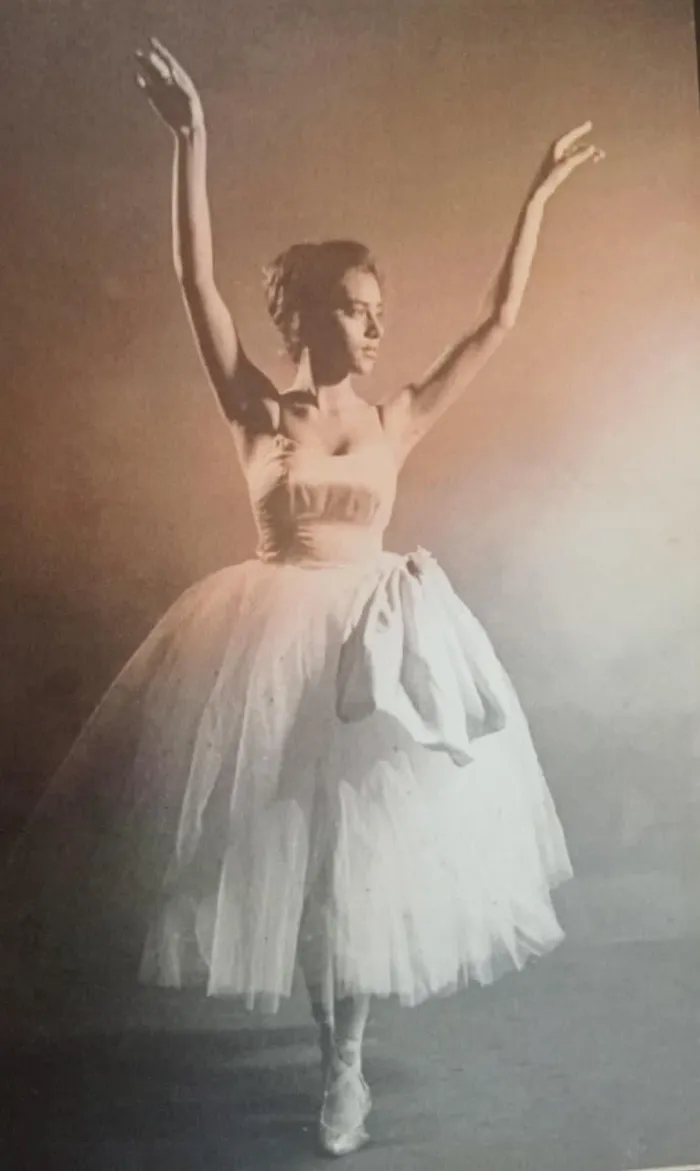
Rajab enjoyed ballet from a young age.
Image: Supplied
Further studies
Rajab said she went on to complete her BA Honours in psychology at the University College for Indians on Salisbury Island.
She majored in psychology, English Literature and drama.
“Studying drama under David Horner was exciting. He left an impression on me that lingered for many years to come. I was the lead lady in the play, The Lady’s not for burning by Christopher Marlow and the lead character in Peter and the Wolf.”
Rajab said she received a Fulbright Scholarship to do her Master’s in education psychology at the University of Kansas in the US in 1968. Later she completed her PhD in social psychology through the University of Missouri.
She said, however, while pursuing her PhD she returned to South Africa to get married.
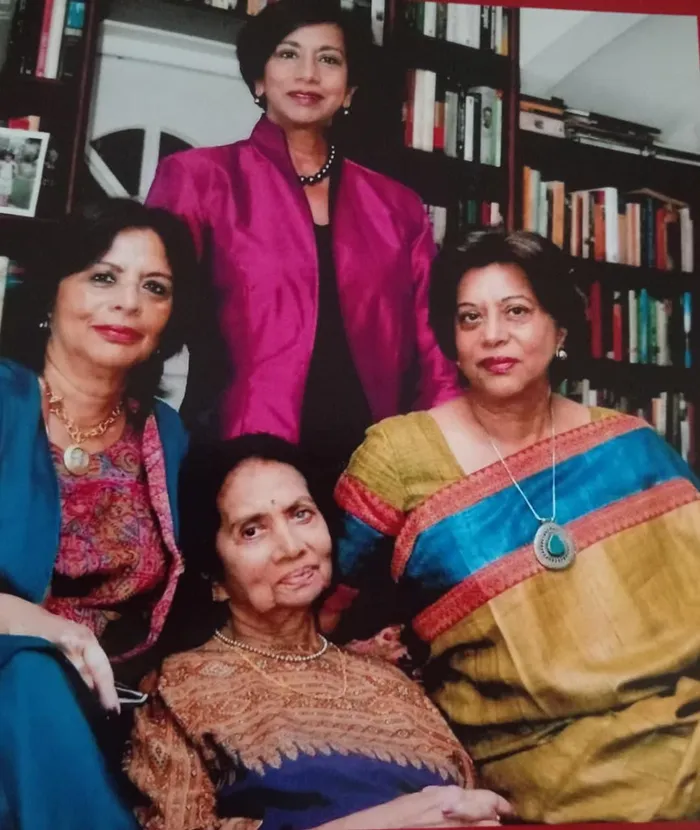
Rajab, far right, with her sisters, Professor Kogila Adam Moodley (left), and Professor Sibithra Moodley Moore, (standing), and their mother, Amartham Moodley.
Image: Supplied
Career
Rajab said upon her return she was employed as a lecturer at the then-University of Durban-Westville (UDW) in 1974.
“I had returned from the US filled with exciting ideas of wanting to make a difference to the lives of students. However, I could only sell my labour at an ethnic institution for Indians and had great difficulty finding a lecturing position. I recall challenging the then-Rector of the university when he gave the job to a less qualified male colleague rationalising his decision as ‘the man is the breadwinner of the family’. I recall saying that my father had paid the same fees as the male counterparts to get the same degree.
“When I finally managed to get a job at the UDW in the department of psychology I learnt that as a married woman my position would be a temporary one, renewable at the end of each year,” she said.
Rajab said that some of the challenges she faced was having to hide her pregnancy by keeping a low profile and wearing loose flowing outfits as there was no such thing as maternity leave.
“Besides being temporary members of staff with no pensions or medical aid, Indian women academics were paid a racially discriminative salary earning far less than Indian males and White colleagues.”
Rajab said she recalled that at the end of seven years when she was on sabbatical leave she lost her job at the ‘ethnic’ university, and had to reapply for the same position and was not successful.
“The position was given to a male academic less qualified and who was a relative of the head of department. I took the matter to court on the grounds of nepotism and unfair selection committee procedures but lost the case with cost when the judge ruled on a technicality that since married women were temporary staff, the university had the right to end a contract as it pleased. No consideration was given to unfair labour practise, gender and racial issues of discrimination or nepotism, and that I was labelled a ‘trouble maker’.
“But at the time, I was jobless and couldn’t sell my labour elsewhere as I was an academic and not registered to practise as a psychologist. I needed to do an internship in order to practise as a psychologist,” she said.
Rajab said after completing a one-year internship at Natal Technikon, she opened up her private practice in the Durban Central area in 1986.
“It was quite a wonderful experience as a practising psychologist, especially after all of the difficulties, tears and challenges that I went through. However, that experience also taught me a lot and something I always share with other women is that you should always have more than one string in your bow, because you never know when a door will close, and you will have to recreate yourself. I recreated myself and never looked back.”
Rajab said in 1989 she applied for the position of senior psychologist at the then-University of Natal, and was successful.
“My professional rise after that was meteoric. In the following year I was appointed director of the Student Counselling Centre. I built the centre up and registered interns to train as educational and counselling psychologists. I was thereafter appointed as the dean of student development at the university, a position I held until my retirement in 2005,” she said.
Rajab said after retirement, she worked as a psychologist at the Centre for the AIDS Programme of Research in South Africa for ten years.
During this time, she also served on the council for the Independent Communications Authority of South Africa for 10 years.
In addition, Rajab now serves as the chairperson of the board for the Democracy Development Program, an organisation that focuses on public interest and democracy in South Africa.
She also currently serves on the boards of the Jonssons Family Trust, KwaZulu-Natal Philharmonic Orchestra, Mazisi Kunene Foundation Trust, and Oppenheimer Memorial Trust, which financially contributes towards education and development.
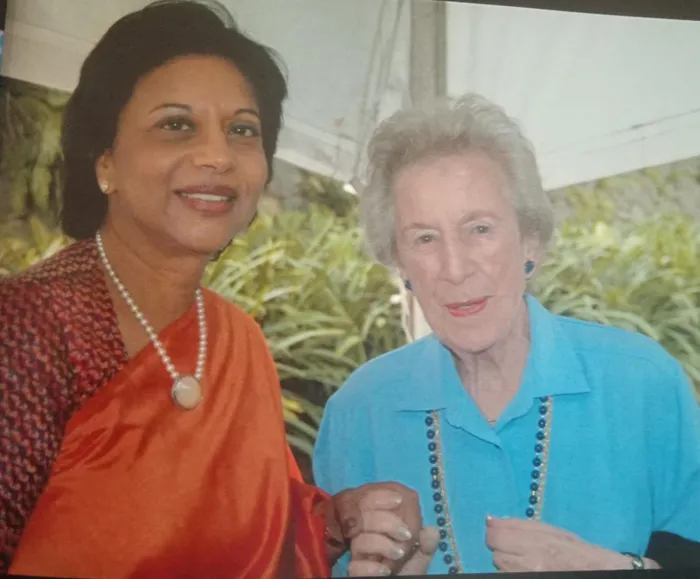
Rajab with the now late Helen Suzman, who served as member of parliament.
Image: Supplied
Highlights
Rajab said her passion for drama led to starring in her first movie, Web of Persuasion.
“While I was at home following the saga with UDW, I was approached by Franz Marx, a producer, who said they were making a movie and would like to use the Rajab family home, known as Salamat, to film. However, before he could leave, he told me I would be perfect for a role in the movie and to please consider. I was hesitant, but asked my family, who told me I must do it.
“I played the role of a teacher who was a role model for a young girl, whose family wanted her to get married but she wanted to follow her dreams. It was a wonderful experience and the movie aired on the SABC channels,” she said.
Writings
Rajab said in the early 1990s, she was approached to write a column for the then-Natal Mercury.
“I initially wrote about the Indian community, however, I soon started doing columns on politics and social affairs. The column was Devi’s Diary which spanned more than a decade. In addition, my column turned into two books, Devi’s Diary and No Subject is Taboo.”
In addition, Rajab has also written columns for Confluence, a London-based newspaper on South-Asian perspectives and opinions for the POST over the years.

Rajab, with the now late Ranjith Kally, a photojournalist, at the launch of her book, Women: South Africans of Indian Origin. Kally contributed the portraits in the book.
Image: Supplied
Books
In 2011, Rajab published her first book, Women: South Africans of Indian Origin, together with the late photojournalist, Ranjith Kally, who provided the portraits.
“We interviewed extraordinary women from all over the country. The book also took me around the world from the US to London and India, among other places. I spoke at various events about the book.”
Rajab said she, together with her grandchildren, have also compiled a book, A Children’s Guide to the Constitution of South Africa.
“This book was a project with a purpose. It is a guide for children about their rights. My grandchildren were very involved in respect of gathering the information and the illustration. We have since donated hundreds of copies to schools,” she said.

Rajab received the Ponnady Award from the Tamil Women’s Federation.
Image: Supplied
Accolades
Over the years, Rajab has received various awards and recognitions for her contributions in both the academic and social fields.
She won the columnist category of the Vodacom Journalist of the Year Awards four times, and was a recipient of the Turquoise Harmony Institute Media Award for outstanding journalism.
In addition, she received the Ponnady Award from the Tamil Women’s Federation and the Paul Harris Award from the Rotary International for her work in youth development.
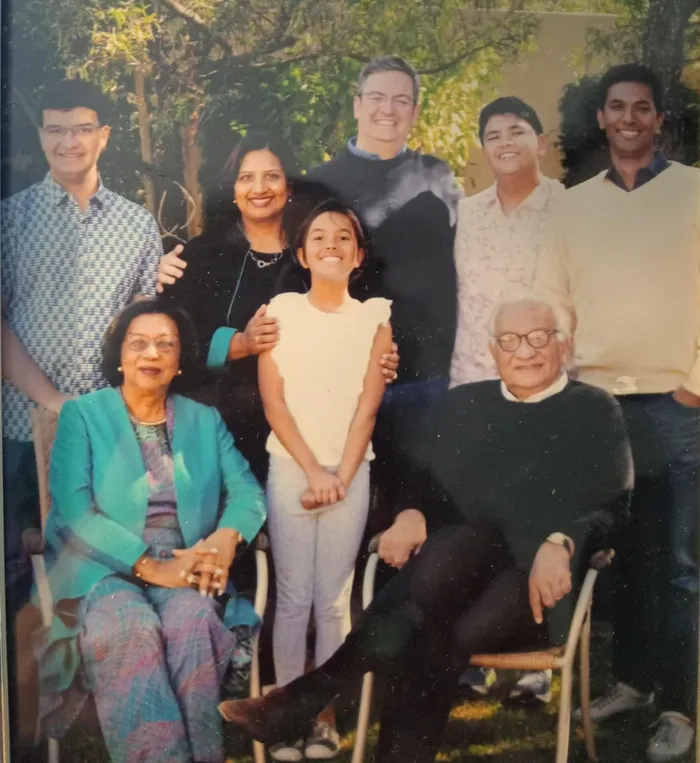
Rajab and her husband, Mahmoud “Mamoo” Rajab, with their family. Standing, from left, Kabir Budlender (grandson), Nasreen Rajab Budlender (daughter), Sophia Rajab (granddaughter), Steven Budlender (son-in-law), Imran Budlender (grandson), and Kalim Rajab (son).
Image: Supplied
Family
Rajab married Mahmoud “Mamoo” Rajab, an advocate, on November 16 in 1974.
They have two children, advocate Nasreen Rajab Budlender, a senior counsel, and Kalim Rajab, managing director of the New National Assurance Company and chairperson of the Helen Suzman Foundation.
They also have three grandchildren, Kabir, Imran, and Sophia.
Relaxation
Rajab said she enjoyed listening to classical music, reading, taking walks on the beach with her husband and spending time with her family and friends.
Related Topics: